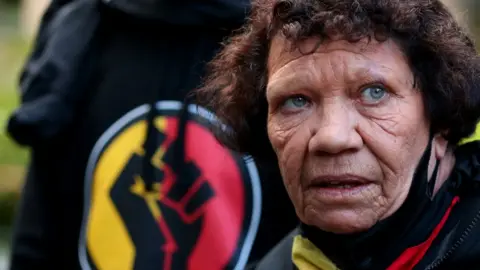Deaths in custody: Australian mother takes fight to UN
 Getty Images
Getty ImagesAustralian mother Leetona Dungay and a team of high-profile lawyers will take a claim over her son's death in custody to the United Nations.
Indigenous man David Dungay Jr died after being restrained by five prison officers in a Sydney cell in 2015.
The complaint argues Australia violated his human rights and failed to protect his life.
The legal team is also seeking to put pressure on the government over its record on Indigenous deaths in custody.
Aboriginal people have the highest rate of incarceration of any group in the world.
Since 1991, at least 474 Indigenous people have died in custody.
While Aboriginal people don't die at a greater rate than non-Aboriginal Australians in custody, they are vastly overrepresented in the criminal justice system.
"The UN needs to know that there is a crisis in this country," Ms Dungay said.
Her son died in a Sydney prison after officers restrained him to stop him eating biscuits. During the struggle, the 26-year-old was pinned face-down by guards and jabbed with a sedative.
Video later shown at his inquest captured his final moments: his laboured breathing and muffled screams under the pack of guards.
"I can't breathe," he yelled repeatedly, before losing consciousness.
An inquest later found that none of the guards should face disciplinary action.
"The government and the prison had a duty of care to keep David safe, with people who were trained properly to keep him alive. The system failed, and David lost his life because of that failure," Ms Dungay said.
"My son had a right to live."
Ms Dungay said as no people or organisations have been held accountable for her son's death, they are taking the fight to the international stage to "shame our government into action".
For that reason, they are filing a complaint with the UN Human Rights Commission. Advocates say it is one of the first cases of an Indigenous death in custody in Australia to be brought to the UN.
"So many Indigenous people have died in custody, but not one police officer or prison guard has been held accountable or faced consequences," she said.
The legal team - which includes international human rights lawyer Geoffrey Robertson - will argue Australia failed to protect Mr Dungay's right to life and failed to take action to stop Aboriginal deaths in custody.
"The Australian government has obligations under international law to protect the right to life and to prevent deaths in custody," lawyer Jennifer Robinso said.
It has been 30 years since a landmark inquiry into Aboriginal deaths in custody which made hundreds of recommendations to address the crisis.
But three decades on, the situation has worsened due to systemic problems and continued disadvantage faced by Aboriginal people.
"The rate of of First Nations deaths in custody remains unacceptably high, with at least five deaths already in 2021. This has to change," Ms Robinson said.
